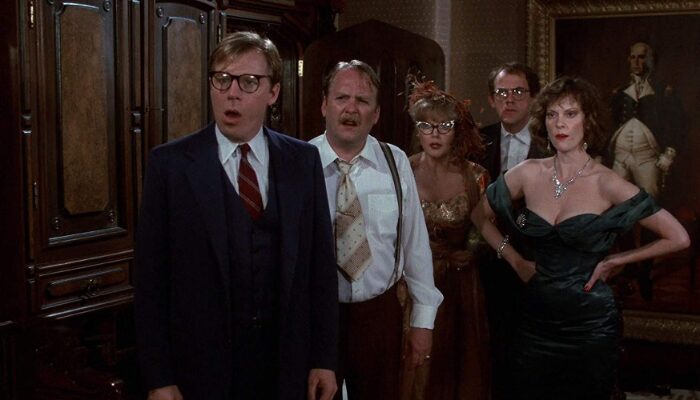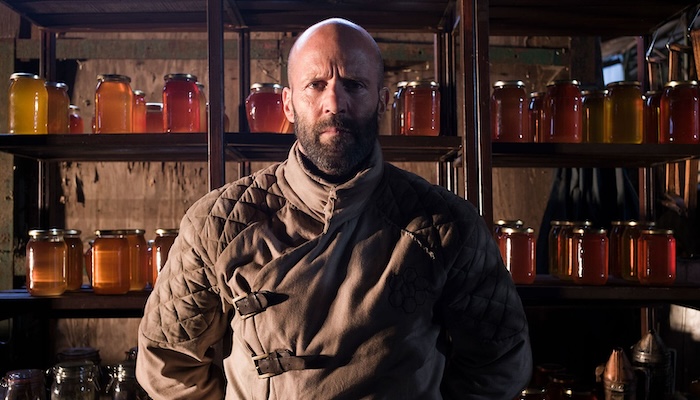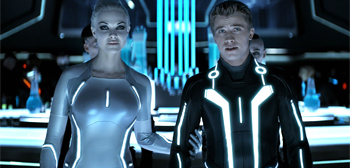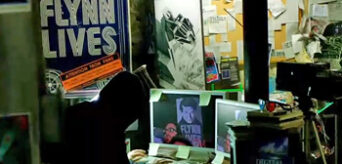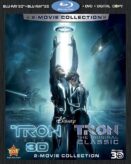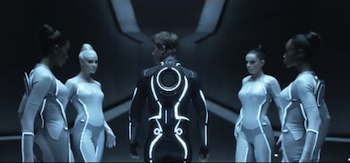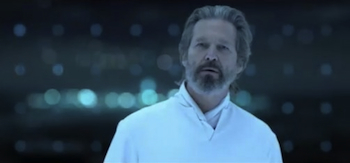Film Review: TRON: LEGACY (2010)
TRON: Legacy is the story of the effect of a father’s absence on his son’s personality, birthrights, evolution, revolution, accepting who and what you really one, the art of creation, and loss of innocence.
Giving birth to something, stamping it with your DNA, expending sweat equity and time started for Kevin Flynn (Jeff Bridges) in the past with TRON, a film manufactured when special effects could barely realize the technological ambition of its screenplay.
Things have changed in big ways in modern filmmaking – an advantageous occurrence for the TRON franchise – and are evident in aggrandized form in The Grid (formerly The Game Grid), a virtual world inside the ENCOM mainframe. Vague has become detailed; miles of neon code have become a sprawling, living metropolis. The society that exists within the mainframe is segmented into two groups: those that go with the flow: purity and bloodletting, and those that don’t. The ones that don’t, the isomorphic algorithms (ISOs) – spawns of the system Kevin Flynn designed – showed up in unexpected ways in this film’s past, were branded outlaws, and are part of the turmoil of the present conflict in the film.
TRON: Legacy is not a sequel that forgets its roots or the era where it came from. Flynn’s arcade and the nostalgia it houses give those scenes there own specific atmosphere. The use of 80’s lingo and lines from the original film served not only as a connective membrane between old and new but added a sense of fun to the eventual cerebral proceedings. If you remember, there was an artificial intelligence program in the first film secretly in control of ENCOM – Master Control Program (MCP) – with puppet human Ed Dillinger (David Warner) as one of its figure heads. Programs in TRON: Legacy speak some of MCP’s famous dialogue mixed with 80’s nostalgia e.g. “End of line man.”
Though advanced on the outside, The Grid is barbaric on the inside, more barbaric than the current less advanced real world. There is a lesson or an observation in this, as CLU (Codified Likeness Utility) 2.0 (Jeff Bridges) – the patriarch of The Grid society, lounges and casually watches humanoid programs compete and kill each other to the adulation and roar of a watching crowd: “those that don’t learn from the past as doomed to repeat it”, even a past they are unaware of and one as far removed as the Roman Empire.
The most unexpected scene-stealer in the film is CLU 2.0. Its determination and calculating nature makes the viewer look forward to the next appearance of its CGI clay face. It’s programmed desire for a perfect system and antagonism towards the one that it believes lost sight of his own ultimate goal is one of the top three positive elements in the film. The second element is the film’s luscious CGI; the vibrant condensation of many imaginative minds is stuck on every sheet of synthetic glass and artificial wall in the film. Everything in the film has either been upgraded or redefined, using every amp modern technology can provide. The third element is the film’s action sequences.
The viewer would think the familial reunion between Kevin and Sam Flynn (Garret Hedlund) and their interactions would be the most intriguing but CLU 2.0’s interactions with the other programs and Kevin Flynn beat them all. Most programs are afraid or intimidated by CLU 2.0 and it is very secretive – like Elim Garak from Star Trek: Deep Space Nine – never trusting anyone.
CLU 2.0’s thirst for perfection is not unlike The Borg’s from Star Trek universe and just like The Borg, CLU 2.0 seeks to conquer in the name of the perfection he seeks. The destruction it rings from the necks of other programs it believes are for their and The Grid’s own good. The Architect from The Matrix – given over to the impulse of handling system initiatives personally – would be a version of CLU 2.0. CLU 2.0 helped to create the current version of The Grid with Kevin Flynn, a mirror of The Architect and Oracle’s efforts.
Where there are good plot points there are bound to be bad ones and TRON: Legacy is no different. First: Sam breaking into the ENCOM building (even though its technically his building as he is majority shareholder), corporate espionage, skydiving off of a building onto a metropolitan street without a permit, and disturbing the peace after he lands. Sam commits all of these crimes in a single evening then gets out of police custody the same night. Second: The societal aspects of The Grid are completely skipped over. Third: Screenwriters Adam Horowitz and Edward Kitsis never disclose were human food comes from in The Grid during the dinner scene (not the liquid they drink from first film). Fourth: CLU 2.0’s grand scheme is so common to earlier James Bond films and partially to the MCP’s old plan it would be detrimental to the film if it were not for the distracting eye candy and I am not just talking about Quorra (Olivia Wilde) or her lack of Jules Verne biographical information. Fifth: Quorra never flew a Light Jet before yet flies it with the precision of an expert within seconds. Sixth: The issue of how something never flesh and blood could become flesh and blood but this is a minor qualm. How could its opposite be true as well? Its one of the main elements of the story and the viewer is forced to just go with it. It does creates an interesting possibility for humanity and its future though, baring the last scene of the film in mind.
Joseph Kosinski’s TRON: Legacy is a more than worthy successor to Tron, expanding upon what was established in the first film and bringing the story to a satisfying conclusion…or a new beginning. That’s what Kevin Flynn wanted. End of Line.
Rating: 9/10
Related Articles
FilmBook's Newsletter
Subscribe to FilmBook’s Daily Newsletter for the latest news!





